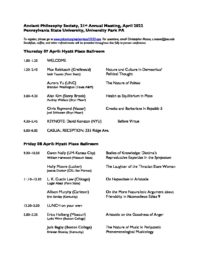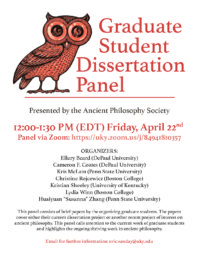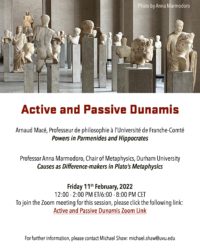
Zoom Link: https://us02web.zoom.us/j/82237519287?pwd=OHVTSi9PUVZBcTNHNUcwSjFSK0thdz09#success


Zoom Link: https://us02web.zoom.us/j/82237519287?pwd=OHVTSi9PUVZBcTNHNUcwSjFSK0thdz09#success
Drew Hyland Archive / Conference
Drew Hyland has been an integral part of the framework of American continental philosophy since the 1960s. He is the author of many highly influential books and articles dealing with ancient Greek philosophy, 20th century continental philosophy, and the philosophy of sport, and his work has been published into multiple languages. From 1967 until 2014 he taught at Trinity College in Hartford, CT, where we are now proud to be opening the Drew Hyland Archive, a comprehensive collection of his published (and some unpublished) works, academic correspondences, teaching materials, as well as some photographs.
In celebration of the opening of this archive, which is housed in the Watkinson Library at Trinity, we will be holding a one-day conference on Friday, October 28th. Throughout the afternoon we will have papers presented by scholars directly influenced by Hyland’s work (including former students), followed by a response by Hyland himself. (Full schedule pasted below.) Immediately following the conference there will be a reception in the Watkinson Library during which the Drew Hyland Archive can be viewed.
For those unable to attend this conference in person, a Zoom link will be provided.
If you would like to attend, please RSVP to Shane Ewegen (shane.ewegen@trincoll.edu) by Oct. 15th.
Shane Ewegen
Department of Philosophy
Trinity College
Schedule: All papers will be held in the 1823 Room in Raether Library on Trinity College campus.
12:00: Jeremy Bell (Emory University)
“A Life Well Lived: Reading Plato with/and Drew Hyland”
12:45: Lydia Winn Barry (Boston College)
“Seeking the Aporetic Soul of Philosophy”
1:30: Robert Metcalf (University of Colorado, Denver)
“What Drew Hyland Is Against: A Theory”
2:15 – Coffee Break
2:45: Ellie Anderson (Pomona College)
“Origins and Futures of Continental Philosophy: Reflections Inspired by Drew Hyland”
3:30: Katherine Davies (University of Texas, Dallas)
“Drew Hyland’s Platonic Dialogue with Heidegger’s Conversations”
4:15: Charles Griswold (Boston University)
“Philosophizing with Drew Hyland: the Dialogue Continues”
5:00: Response: Drew Hyland
6:00: Reception in the Watkinson / Viewing of Drew Hyland Archive





In Plato and Aristophanes, Marina Marren contends that our search for communal justice must start with self-examination. The realization that there are things that we cannot know about ourselves unless we become the
subject of a joke is integral to such self-scrutiny. Jokes provide a new perspective on our politics and ethics; they are essential to our civic self-awareness.
Marren makes this case by delving into Plato’s Republic, a foundational work of political philosophy. While the Republic straightforwardly condemns the decadence and greed of a tyrant, Plato’s attack on political idealism is both solemn and comedic. In fact, Plato draws on the same comedic stock and tropes as Aristophanes’s plays. Marren’s book strikes up an innovative conversation between three works by Aristophanes—Assembly Women, Knights, and Birds—and Plato’s philosophy, prompting important questions about individual convictions and one’s personal search for justice. These dialogic works offer critiques of tyranny that are by turns brilliant, scathing, and exuberant, making light of faults and ideals alike. Philosophical comedy exposes despotism in individuals as well as systems of government claiming to be just and good. This critique holds as much bite against contemporary injustices as it did at the time of Aristophanes and Plato.
Purchase Here (https://nupress.northwestern.edu/9780810144187/plato-and-aristophanes/)

Biopolitics and Ancient Thought. Edited by Jussi Backman and Antonio Cimino. (Classics in Theory.) Oxford: Oxford University Press, 2022. 240 pages.
The volume studies, from different perspectives, the relationship between ancient thought and biopolitics, that is, theories, discourses, and practices in which the biological life of human populations becomes the focal point of political government. It thus continues and deepens the critical examination, in recent literature, of Michel Foucault’s claim concerning the essentially modern character of biopolitics. The nine contributions comprised in the volume explore and utilize the notions of biopolitics and biopower as conceptual tools for articulating the differences and continuities between antiquity and modernity and for narrating Western intellectual and political history in general. Without committing itself to any particular thesis or approach, the volume evaluates both the relevance of ancient thought for the concept and theory of biopolitics and the relevance of biopolitical theory and ideas for the study of ancient thought. The volume is divided into three main parts: part I studies instances of biopolitics in ancient thought; part II focuses on aspects of ancient thought that elude or transcend biopolitics; and part III discusses several modern interpretations of ancient thought in the context of biopolitical theory.
PART I: BIOPOLITICS IN ANCIENT THOUGHT
1:Biopolitics and the “boundless people”: An Iliadic model (Sara Brill)
2:Plato and the biopolitical purge of the city-state (Mika Ojakangas)
3:Sovereign power and social justice: Plato and Aristotle on justice and its biopolitical basis in heterosexual copulation, procreation, and upbringing (Kathy L. Gaca)
PART II: ANCIENT THOUGHT BEYOND BIOPOLITICS
4:Otherwise than (bio)politics: Nature and the sacred in tragic life (Kalliopi Nikolopoulou)
5:Beyond biopolitics and juridico-institutional politics: Aristotle on the nature of politics (Adriel M. Trott)
6:Bene vivere politice: On the (meta)biopolitics of “happiness” (Jussi Backman)
PART III: BIOPOLITICAL INTERPRETATIONS OF ANCIENT THOUGHT
7:Hannah Arendt’s genealogy of biopolitics: From Greek materialism to modern human superfluity (Ville Suuronen)
8:From biopolitics to biopoetics and back again: On a counterintuitive continuity in Foucault’s thought (Sergei Prozorov)
9:Agamben’s Aristotelian biopolitics: Conceptual and methodological problems (Antonio Cimino)
https://global.oup.com/academic/product/biopolitics-and-ancient-thought-9780192847102?cc=nl&lang=en
https://doi.org/10.1093/oso/9780192847102.001.0001

Deleuze, A Stoic shows Deleuze’s engagement with Stoicism produced many of his most singular and powerful ideas, reveals a lasting influence on Gilles Deleuze by mapping his provocative reading of ancient Stoicism, unearths new possibilities for bridging contemporary philosophy and classics by engaging a vital yet recently rising area of scholarship: continental philosophy’s relationship to ancient philosophy, and introduces the untranslated Stoic scholarship published by pre- and post-Deleuzian French philosophers of antiquity to the English-reading world. Deleuze dramatises the story of ancient philosophy as a rivalry of four types of thinkers: the subverting pre-Socratics, the ascending Plato, the interiorising Aristotle and the perverting Stoics. Deleuze assigns the Stoics a privileged place because they introduced a new orientation for thinking and living that turns the whole story of philosophy inside out.
Review: “Johnson has produced a profound and erudite study of the stoic roots of Deleuze’s philosophy. This work is of vital importance for those interested in Deleuze, the continuing relevance of the stoic tradition, and, more fundamentally, the ethics of materialism.” – Dr. Henry Somers-Hall, Royal Holloway, University of London
The Deleuze-Lucretius Encounter explores how Deleuze’s thought was shaped by Lucretian atomism – a formative but often-ignored influence from ancient philosophy. More than any other 20th-century philosopher, Deleuze considers himself an apprentice to the history of philosophy. But scholarship has ignored one of the more formative influences on Deleuze: Lucretian atomism. Deleuze’s encounter with Lucretius sparked a way of thinking that resonates throughout all his writings: from immanent ontology to affirmative ethics, from dynamic materialism to the generation of thought itself. Filling a significant gap in Deleuze Studies, Ryan J. Johnson tells the story of the Deleuze-Lucretius encounter that begins and ends with a powerful claim: Lucretian atomism produced Deleuzianism.
Review:” Readers will be surprised and charmed at the parallels Ryan Johnson finds between Deleuze and Lucretius. The lines he draws from Ancient atomist ideas about relations, movements, and speeds, through to Deleuzian materialism are exciting and convincing. The book is packed with interesting ideas and twists and is exacting in its scholarship. On top of that, it is beautifully written.” – Jay Lampert, Duquesne University

Please see the attached program for the 2022 Annual Independent Meeting of the Ancient Philosophy Society, being held in person at Penn St. University this April 7-10. It would be great to see you there.
Please contact Christopher Moore (crm21@psu.edu), Michael Shaw (Michael.shaw@uvu.edu), or Marina McCoy (marina.mccoy@bc.edu) for further information.
Sincerely,
Michael Shaw

The Ancient Philosophy Society is holding a zoom panel featuring graduate students working in ancient philosophy from institutions historically associated with the APS. Each participant will spend 5-10 minutes to present some of their work, some from within their dissertation project and others more broadly, after which there will be a chance to discuss all their projects big and small.
Please join us at 12noon EDT on 22-April to hear some of what’s up and coming in Ancient Philosophy. This is a student organized event. A flyer for the event is attached.
Panel via Zoom: https://uky.zoom.us/j/84941810357

In case you are having any trouble with the Zoom link in the PDF Flyer for the panel on Active and Passive Dunamis this Friday, February 11th at 12pm Eastern, 6pm Central European Time, here is a copy of the Zoom link. Just click on the link below to join the meeting this Friday.
Topic: APS Session: Active and Passive Dunamis
Time: Feb 11, 2022 12:00 PM Eastern Time (US and Canada)
Join Zoom Meeting
https://us02web.zoom.us/j/83109225683?pwd=eldrVXRBdnEyVkMrUW8yOHhMUWVwZz09
Meeting ID: 831 0922 5683
Passcode: 965363
Thank you,
Michael Shaw and Marina McCoy